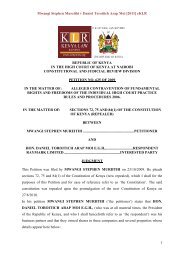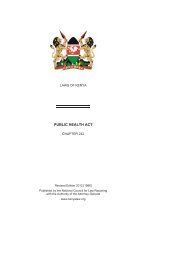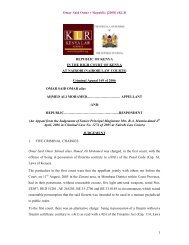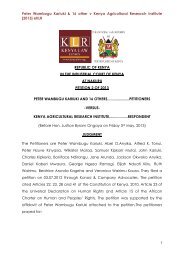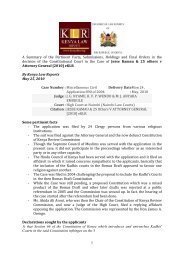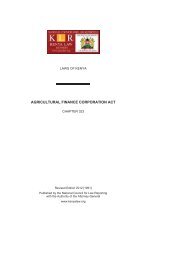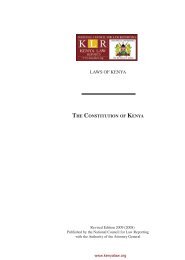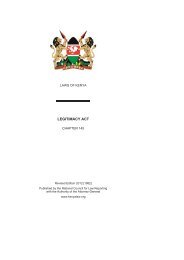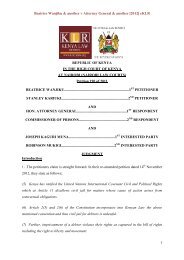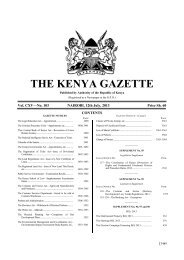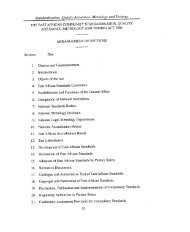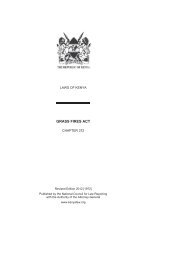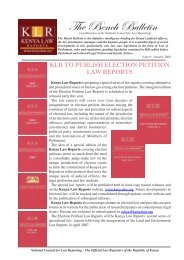Create successful ePaper yourself
Turn your PDF publications into a flip-book with our unique Google optimized e-Paper software.
Samuel Njuguna Kimemia v Rose Mgeni Mtwana [2012] eKLRREPUBLIC OF KENYAIN THE HIGH COURT OF KENYAAT MOMBASACommercial Civil Case 56 of 2009SAMUEL NJUGUNA KIMEMIA………………………..…APPLICANTVERSUSROSE MGENI MTWANA ………………………….……RESPONDENTJUDGMENT1. Every judge on his first posting in Mombasa, is instantly confronted by an unnervinglegal situation unknown in all his years of learning. She or he has been schooled in theCommon <strong>Law</strong> traditions and land tenure systems that declared the principle:“cujus est solem ejus et usque ad coelum et ad inferos”(to whomsoever the soil belongs, he owns to the sky and the depths below to anindefinite extent)Upon this principle, the country’s substantive land law and registration systems arebased. The jurist in Mombasa is, however, ambushed by a land system or phenomenon in theCoast known as:“Ownership of house without land”Judicial notice has long been taken of this strange system in the Coast, and there is substantialcase law on it. But scholarship and legislation have lagged behind. This case is about adispute relating to a property under the “house without land” system.1
Samuel Njuguna Kimemia v Rose Mgeni Mtwana [2012] eKLRRelationship Background2. The Plaintiff, Samuel Kimemia was a teacher at Saint Georges High School, Kaloleni,from 1995 up to the time this suit was heard. Around the year 2000, he met the Defendant,Rose Mtwana, a Matron at Coast General Hospital. They struck a relationship – whetherboyfriend and girlfriend, or husband and wife – is not clear. She was staying in Hamisi andhe, at Magongo. In any event, they appear to have cohabited intermittently until about 18 thJuly, 2009 when they had a major altercation in his house in the schoolcompound. Kimemia’s wife had visited and was staying in his house, when Rose alsovisited. In the throes of surprise, betrayal and envy, a scuffle thereupon ensued and thescorned Rose suffered injuries which she reported to the police. A formal complaint was filedand a prosecution commenced. Kimemia pleaded guilty to assault and was fined Kshs.2,000/=. The evidence is in the proceedings in Criminal case Number 270 of 2009 producedas DExb 1. The facts of the criminal charge are:“Accused person is a teacher at St. Georges High School where he resides.Complainant is a girlfriend. On 19 th July, 2009, the complainant visited the accused andfound wife to accused present. There was a disagreement…Accused person assaultedcomplainant……”3. Rose alleges that she and Kimemia were married under Kikuyu Customary <strong>Law</strong> andthat there was a child, one I.K, born of the union. However, no evidence was produced of thedowry paid, or anything else to show existence of the said marriage. Nor were documentsevidencing the birth or existence of the said child produced at trial. Since the altercation atKimemia’s house in July 2009, the parties have not had a good relationship. This disputearose soon after that.family.The foregoing paragraphs summarise the parties’ relationship from the perspective ofPurchase of Suit Property4. On 5 th July 2007, Kimemia and Rose entered into a sale agreement to purchase a“House without land on Plot Number 350 MN, Bokole, Magongo.” The agreement was2
Samuel Njuguna Kimemia v Rose Mgeni Mtwana [2012] eKLRproduced as PExb 1. The vendor was one Amina Mohamed and the purchasers are indicatedas Kimemia “jointly with Rose Hereinafter referred to as the purchaser of one part.” Thehouse was a ten roomed Swahili house without land and the consideration was Kshs.535,000/= only. The conditions of sale included full payment of the purchase price on signingthe agreement, and transfer of all documents to the purchaser.5. In her statement of defence, Rose asserts that she and Kimemia were livingtogether ashusband and wife at the time of purchase of the property. She alsoalleges that she contributedKshs. 100,000/= to the purchase and also to renovation of the property, and thus, that the suitproperty was jointly purchased by them. Leaving the question of marriage aside for a while,the evidence availed indisputably shows that the purchase price for the suit property wasraised solely by Kimemia. He produced satisfactory evidence showing he had taken a loanfrom <strong>Kenya</strong> Commercial Bank, and made the payment for the property. PExB 2 is a loanapplication for Kshs. 647,881.00, duly signed by him on 2 nd April, 2007; PExb 3 and PExB 4are <strong>Kenya</strong> Commercial Bank cheque issue voucher and copy of a Banker’s cheque,respectively, both dated 5 th July, 2007. They are for Kshs. 535,000 – the purchase price –drawn in favour of Amina Mohamed, the seller. PExb 4 is a copy of Kimemia’s salary slipshowing the monthly loan deductions of Kshs. 16,900/=, and PExb 7 is his <strong>Kenya</strong>Commercial Bank statement, which shows his regular salary after loan deductions.Renovation to Suit Property6. Kimemia (PW1) gave evidence that from the balance of the loan money, he purchasedmaterials to repair the suit property which was hardly habitable. He said he spent about Kshs.292,918/- for materials and labour. He provided a bundle of receipts as PExB 7, but for thelabour component, Kimemia provided a schedule prepared by himself but no receipts. As faras he was concerned, Rose did not spend any money on repairs and renovations.On her part, Rose (DW1) gave evidence that in 2008 when they started repairs to thehouses, she led the renovations, and whenever materials would run out, she would purchasemore and use them in the renovations. In particular, she produced DExb 2 an agreement dated15 th May, 2009 between a builder and one of the tenants Geoffrey Mkaya, in which he paidKshs. 27,965/- to refurbish the ceiling. The amount was to be set-off from his monthly rentpayable to the owners as guaranteed by Rose. What is very clear from all the evidence3
Samuel Njuguna Kimemia v Rose Mgeni Mtwana [2012] eKLRadduced is that although both parties participated in the renovations, Kimemia bore the lion’sshare of the financial burden of renovations.The issues7. No issues were formulated by the parties prior to trial. In their written submissions,however, each party has identified issues, of which two are common. They are as follows:a) Whether Kimemia and Rose were husband and wife at the time of purchaseb) Whether Rose was to hold, or holds, a half share in the suit property on trust forKimemia.From an analysis of the pleadings and the other issues which were framed but not agreed, Ifind the other issues to be:c) Whether Rose misrepresented to Kimemia that she had to be included in the purchaseas a local person because Kimemia was a non-local and not from that area.d) Whether Kimemia is entitled to an account of rent collected for the suit propertyfrom 2009e) Whether Kimemia is entitled to an injunction restraining Rose from dealing withthe Suit Property.f) Whether Rose’s name should be cancelled from the property owner’s records.I will now deal with each of the issues.Issue a: Whether Kimemia and Rose were husband and wife at the time of purchase ofthe suit property8. In his plaint, Kimemia alleges only that the two were “involved in a relationship.” Inevidence in chief, he said she was a “friend”, who “never spent more than a day with me in aweek”, and “we never cohabited.” In cross-examination, he was unable to say for how longthey had been friends. However, in his evidence in cross-examination of how Rose barged4
Samuel Njuguna Kimemia v Rose Mgeni Mtwana [2012] eKLRinto his house; rushed to the bedroom and violently threw his wife out of bed; how his wifesought refuge in a neighbour’s house; to me discloses the fury of a jilted lover on findinganother woman in “her” man’s bed.When confronted with the allegation of fathering a son with Rose, he did not violentlyobject. In fact, he was hardly surprised and wondered where the child was, and if the childhad died at birth, why he “was not invited to the funeral as he had no opportunity to burry(sic) my child.” This appears to me the stance of a person who had been engaged in intimaterelations in which he expected offspring, and so is flummoxed when an offspring is allegedbut not presented.9. On her part, Rose’s evidence is that she was married to Kimemia under customarylaw. She says she went to Kamwangi in Thika, with Kimemia where she met hisparents. They did not travel with anyone else. A goat or cow were, she alleges slaughtered inher welcome. She, however, said that no bride price was paid and she could not remember thedates of this event. She says he fathered her son I.K who was born in 2008. She, however didnot produce documents evidencing the birth of the child, because, she said that issue was noton trial.DW2, Wycliffe Akute, a long-time tenant at the Suit Property said that Kimemia andRose came to the suit property at some point, and were introduced as husband and wife. Hesaid that Kimemia told the tenants to be paying rent to Rose, his wife. That is what Wycliffhad been doing since then.10. From the evidence, I do not get the impression that Kimemia and Rose were married. Isee a close relationship, a companionship of intimacy or occasional consort, deep enough todraw out the jealousness of a spurned lover when Kimemia’s “real” wife came calling. Ifthere was cohabitation at all, it is not shown to have been continuous as there is little evidenceof the things they did together, or jointly other than the purchase of the suit property, andrenovations.I therefore find that Rose was not, by any definition, the wife of Kimemia, although Ihave no doubt that they were, at some time, intimate lovers.5
Samuel Njuguna Kimemia v Rose Mgeni Mtwana [2012] eKLRIssue b: Whether Rose holds, or was to hold, a half share in the suit property on trust forKimemia.11. The allegation in the plaint, denied in the defence, is that during discussions it wasagreed between the two that the suit property would be conveyed into their joint names,although Kimemia would solely contribute to the purchase price. Further, in paragraph 5, theplaint asserts:“ a) ….b) That the Defendant’s name would only be included as a purchaser since the Defendanthad misrepresented to the Plaintiff the fact that he could not be allowed to own a propertyin that area because he was not a local person but from upcountry.c) That the Defendant would hold the half share of the suit property on trust for the solebenefit of the Plaintiff.”Rose, of course denied these allegations. What is most unusual in the plaint, though, is thestatement at paragraph 5(b) that it was agreed during the pre-purchase discussion between theparties that the Defendant would be included as a purchaser since she had mademisrepresentations to the Plaintiff. If the Plaintiff knew of the alleged misrepresentations, whythen did he proceed to include the Defendant in the purchase?12. I have carefully perused the Sale Agreement (PExb1). It identifies Kimemia and Roseas “joint purchasers of one part.” There is no indication in the Agreement, or in any otherwriting or communication between the parties, to suggest that Rose’s name was to feature inthe Agreement on any condition or subject to any trust or other understanding. No reading ofthe document suggests such trust or condition.In this case, even subsequent actions of the parties after the purchase do not evince anyintention on the part of Kimemia that Rose’s inclusion in the purchase was done on trust forhim. That is, that issue did not arise at all, until after the two had fallen out, and criminalproceedings were instituted. It was then that this suit was filed.6
Samuel Njuguna Kimemia v Rose Mgeni Mtwana [2012] eKLR13. In my view, It was for Kimemia to prove the existence of a trust. A mere allegation ofits existence cannot create one. It is trite law that a trust, by definition, arises when a donor orgrantor reposes a confidence in a person, who is termed a trustee, for the benefit of anotherwho is called a cestui que trust, respecting property which is held by the trustee for thebenefit of the cestui que trust. The essential elements of trust are, according to Blacks <strong>Law</strong>Dictionary, as shown in the description of trust:“A trust, when not qualified by the word “charitable” “resulting” or “constructive”,is a fiduciary relationship with respect to property subjecting the person by whom the titleto the property is held to equitable duties to deal with the property for the benefit of anotherperson, which arises as a result of manifestation of an intention to create it.”Nothing in the purchase transaction manifests any intention on the part of Kimemia thatRose should hold a share of the property for him or anyone else. Indeed, the purchase isindicated to have been made “jointly”. There are no distinct and separable shares indicated oridentified in the purchase agreement. And even if there were, no direction is given as to howto treat them.14. This court is bound, in circumstances where it is sought to imply a trust, to follow thecase of Mbothi and 8 Others vs Waitimu and 11 Others [1986] KLR 171, where the Courtof Appeal held:“The courts will not imply a trust save in order to give effect to the intentions of theparties and such intention must be clearly determined before hand. Trust was not pleadedand from the evidence, the parties did not intend to create a trust. The court could not implya resulting trust.” See Cork vs Fountain (1676) 36 ER 984, 987; Marie Ayoub and Othersvs Standard Bank of South Africa Limited and Another [1963] EA 619, 622; JosephKamau Kameni vs Ndungu Kiiru C.A EA Civil Appeal 43 of 1976.In Marie Ayoub vs Standard Bank of South Africa and Another [1963] EA 619 thePrivy Council affirmed the statement of the law to be as follows as stated in Cook vsFountain (1) (36 ER at Page 987):7
Samuel Njuguna Kimemia v Rose Mgeni Mtwana [2012] eKLR“… so the trust, if there be any, must either be implied by the law, or presumed by thecourt. There is one good, general, and infallible rule that goes to both these kinds of trust;it is such a general rule as never deceives; a general rule to which there is no exception,and that is this; the law never implies, the court never presumes a trust, but in the case ofabsolute necessity.”15. Nothing in the evidence suggests a predisposition of a trust that necessitates apresumption of one. In view of the foregoing, I am unable to find and hold that Rose washolding any shares, in the property, or is holding any part of the property as a trustee forKimemia. Indeed, I do not see that any shares exist, the parties being joint and inseparableowners of the suit property. No shares have been distinguished in the agreement and none aredistinguishable in interpretation. Lovers, in their passion are wont to do unusual things, and inthis case there is no evidence that the purchase was dictated by anything less or more thanlovers’ fancy.16. The issue I have just dealt with on trusts, also disposes of the two other issues, (e)and (f), which is were follows:(e) Whether Kimemia is entitled to an injunction restraining Rose fromdealing with the suit property, andrecords.(f)Whether Rose’s name should be cancelled from the property owner’sHaving found, as I have that no trust has been proved, I can only concludethat the inclusion of Rose’s name as a purchaser was purely gratuitous on the part ofKimemia. Having done the act, he cannot now reverse the proffered gift and obtain aninjunction to prevent her from enjoying the same. Similarly, having proffered the gift,Kimemia cannot now obtain a cancellation by court of Rose’s name from the landlord’srecords in absence of a contractual pre-condition, except with her consent. As a joint owner,she instantly entered, and is now in, the position of proprietor of that which was proffered her.Issue c: Whether Rose misrepresented to Kimemia that she had to be included inthe purchase as a local person because Kimemia was not from that area.8
Samuel Njuguna Kimemia v Rose Mgeni Mtwana [2012] eKLR17. I think that the situation that emerges from the evidence, looked at as a whole, does notimpute blame on Rose for misrepresentation. I have carefully looked through all the evidence,and have taken appropriate precautions because I did not see and hear the first two witnessesin this case who were led, not before me, but before Hon. Justice Ojwang now elevated to theSupreme Court.This was a part heard case where the parties consented to its continuation, and I haverelied on the written record. A misrepresentation in law is an assertion or manifestation bywords or conduct that does not accord with the facts or with the truth. I, quite frankly, havenot seen on record any evidence led at all by the plaintiff to prove this point. Indeed, from therecord of proceedings, I have not seen any pre-purchase agreement or communications, eitherbetween the parties or with the vendor, from which a misrepresentation could be construed.Nor is it alleged, or shown, that there was misrepresentation by conduct. Accordingly, Idismiss this issue without need for further consideration.2009.The final issue is: whether Kimemia is entitled to an account of rent collected from18. I have already held that Rose and Kimemia jointly hold the suit property in undivided,indistinct shares. On account of that, and the suit property being for letting, as a business, it isincumbent that both parties are clearly in the picture of what goes on, what comes in and goesout in form of revenues and expenses. Such joint ownership places a mutual right andexpectation of transparency upon each party to account to the other, in the same way in whichan inarticulated partnership creates a presumption of fair dealing.In my view, Rose’s approach to the rents received and monies spent, was unfortunatelycasual. She could not say for sure how much she had been paid since she started collectingrent. She could not say how many tenants there were at various times, and she kept norecords. This cannot augur well for the joint ownership arrangement.On this point, therefore, I find in favour of Kimemia. I would order that Rose shall giveto Kimemia an account of all income received and true expenses reasonably paid out for theperiod from 2009 to date. Rent is a right to each joint owner of the suit property, andKimemia is entitled to a share thereof.9
Samuel Njuguna Kimemia v Rose Mgeni Mtwana [2012] eKLRIn this case, I will order the parties to agree on the extent of each party’s share in therent earned by the property. Failing agreement, I shall allow the parties to make submissionsbefore me on the extent of their respective percentage interest in the suit property includingdetailed submissions on the rental income and expenses.19. In summary, I find as follows on each of the issues set out in paragraph 6 hereof. Oneach of issues (a), (b), (c), (e) and (f) I find in the negative.On issue (d) I find in the affirmative, subject, thereafter, to ascertainment of eachparty’s share of rent. I order a mention within thirty (30) days of the date hereof for furtherdirections thereon, should the parties be unable to agree, outside court, on their respectiveshares and rents.Orders accordingly.SIGNED BY:……………………R.M. MWONGOJUDGERead in open court on this…30 th day of April 2012(BY HON. JUSTICE JOHN MWERA)Coram:1. Judge: Hon. John Mwera2. Court clerk: T. FurahaIn Presence of Parties/Representative as follows:a) …………………………………………………………………………….10
Samuel Njuguna Kimemia v Rose Mgeni Mtwana [2012] eKLRb) …………………………………………………………………………….c) …………………………………………………………………………….d)………………………………………………………………………………11



